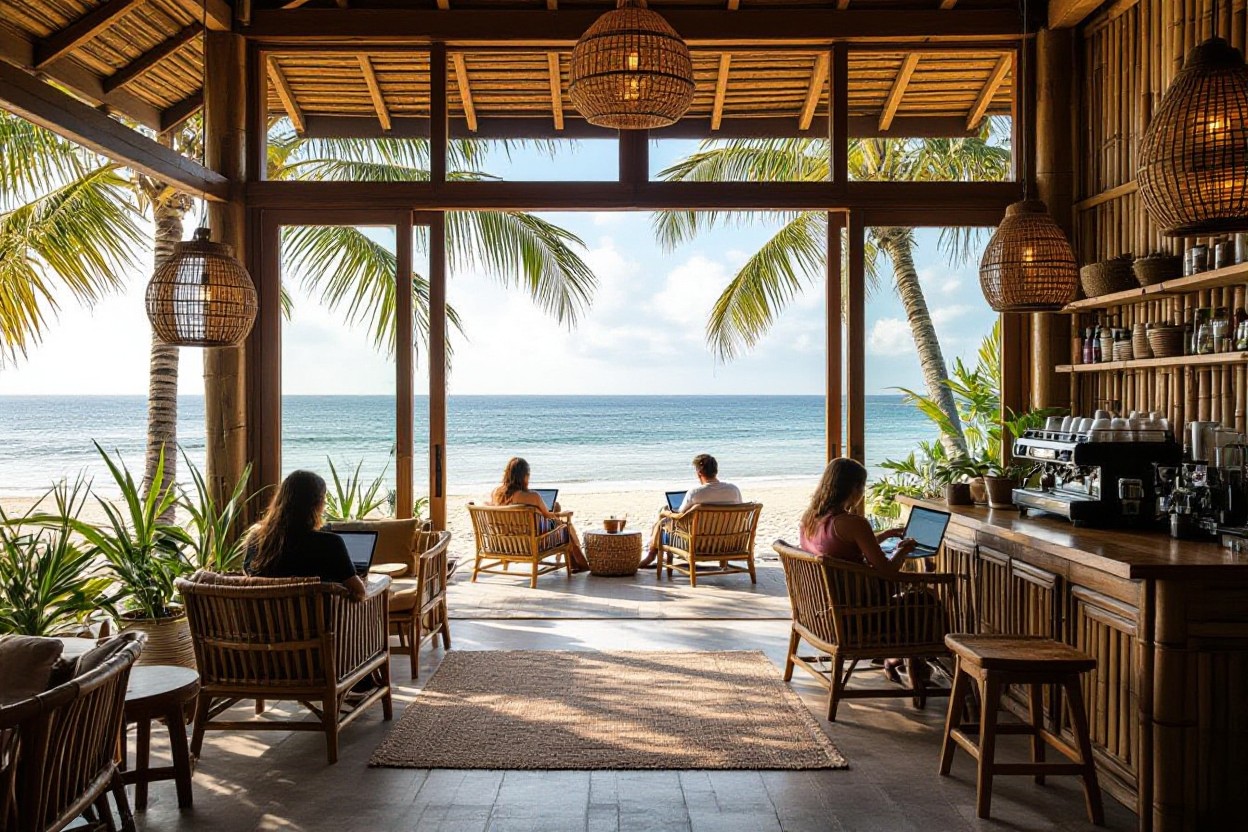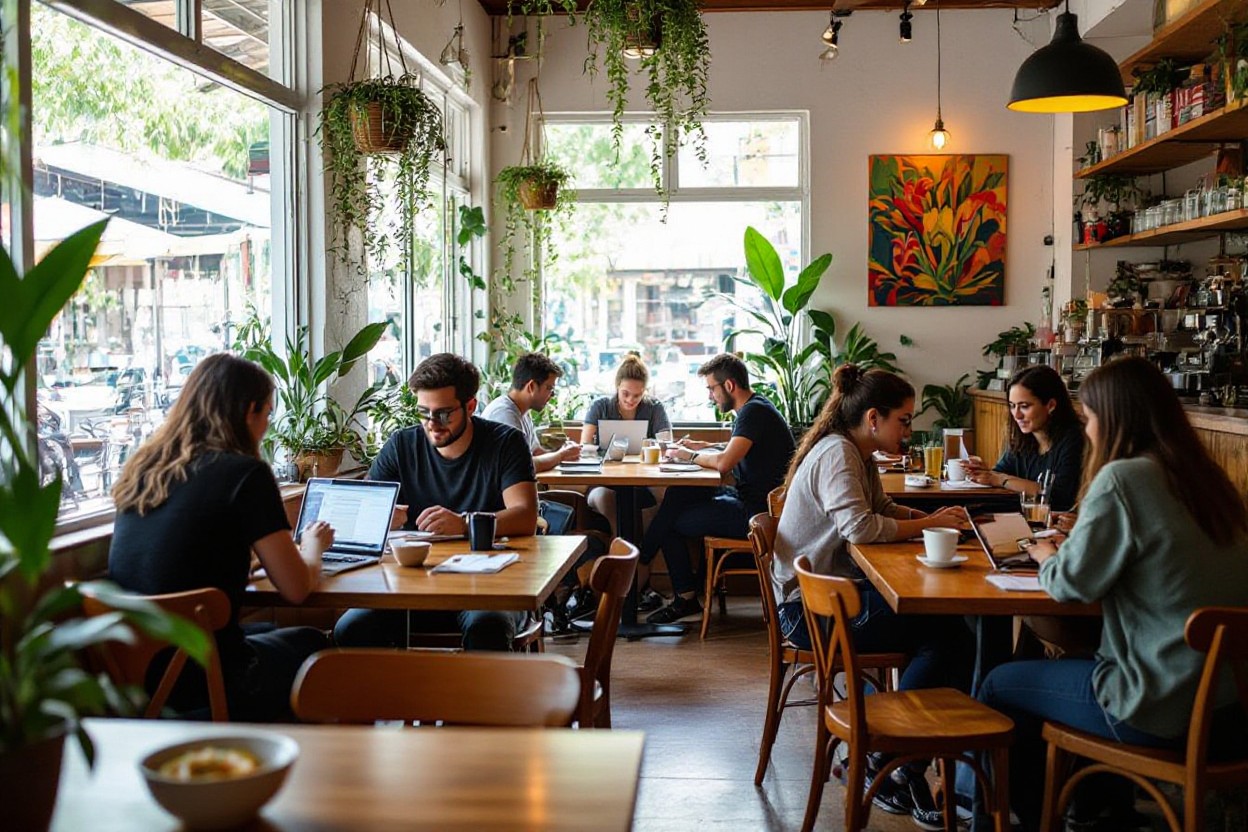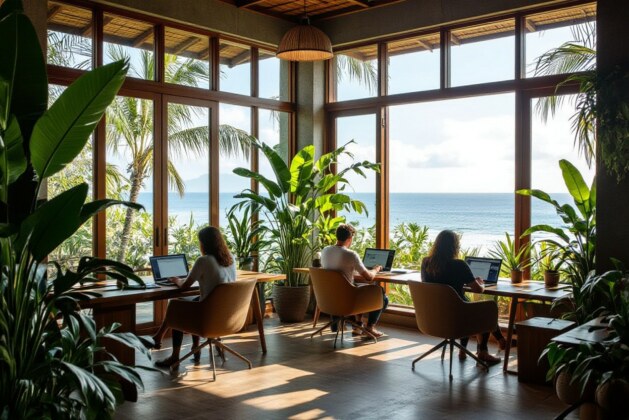Many digital nomads seek the perfect balance of work, culture, and adventure in Southeast Asia. In this guide, I will share my insights on the best spots known for reliable internet, affordable living, and vibrant communities tailored for remote work. While some locations offer stunning beaches and lively nightlife, others come with challenges like safety concerns or limited amenities, which I’ll highlight to help you make informed decisions. Your journey to finding the ideal digital nomad destination starts here, with practical advice to enhance productivity and enjoyment throughout 2025.
The Allure of Southeast Asia for Digital Nomads
Southeast Asia continuously captivates digital nomads with its unbeatable blend of affordability, vibrant communities, and scenic diversity. I’ve noticed that cities like Chiang Mai, Bali, and Ho Chi Minh City aren’t just places to work—they’re hubs where creativity and networking flourish. Fast internet, coworking spaces, and a welcoming local culture create an environment where your productivity can thrive without breaking the bank. The balance of modern amenities against breathtaking natural backdrops gives you a lifestyle that’s both exciting and sustainable.
Why Southeast Asia Became a Digital Nomad Hub
The region’s rise as a digital nomad mecca stems from a mix of low living costs, reliable internet infrastructure, and government initiatives promoting digital economies. For instance, Thailand’s Smart Visa program and Bali’s push for digital nomad-friendly regulations attract talent worldwide. Local cafes and coworking hubs cater specifically to remote workers, creating a dynamic ecosystem that’s hard to find elsewhere. This mix of opportunity and accessibility shapes Southeast Asia’s standout reputation among global freelancers and entrepreneurs.
Cultural and Economic Considerations in 2025
By 2025, Southeast Asia’s cultural richness remains a compelling factor, but economic shifts require careful navigation. Inflation in popular cities like Hanoi and Jakarta has subtly increased living costs, emphasizing the need to budget wisely. Meanwhile, respecting local customs and business etiquette enhances your experience and networking potential, especially in places where relationship-building drives success. Awareness of ongoing political climates and visa regulations helps avoid pitfalls associated with rapid regional changes.
Delving deeper, cities such as Kuala Lumpur have implemented digital nomad visas, easing residency for remote workers aiming for longer stays. On the cultural front, participation in local festivals like Thailand’s Loi Krathong or Bali’s Galungan offers immersive experiences, enriching your stay beyond work. However, economic disparities between urban and rural areas can impact access to reliable services—factoring this in helps you choose destinations with both vibrant community and imperative amenities. Knowing these nuances allows you to craft a more informed and fulfilling nomadic journey.
Top Cities that Blend Work and Relaxation
Southeast Asia offers an array of cities where work seamlessly melds with leisure, each boasting unique vibes tailored for digital nomads. From beachside chill spots to bustling markets and cozy cafes, you’ll find places that fuel productivity while satisfying wanderlust. These cities don’t just boast great Wi-Fi—they deliver immersive cultural experiences, affordable living, and dynamic communities that elevate your remote work lifestyle.
Bali: The Creative Capital of Remote Work
Bali continues to dominate as a hotspot for creative professionals and freelancers. Areas like Canggu and Ubud attract nomads with their mix of surf, yoga retreats, and cafes equipped with high-speed internet. Coworking spaces like Dojo Bali foster collaboration and networking, making it easier to blend work and inspiration. Beyond work, you can unwind to vibrant traditional ceremonies or explore lush rice terraces—perfect for balancing busy workdays.
Chiang Mai: Affordable Living Meets Vibrant Community
Chiang Mai remains a magnet for budget-conscious nomads who crave a close-knit, vibrant community. With monthly rents as low as $300 for comfortable apartments, your wallet stretches far here. The city buzzes with digital nomad meetups, markets, and affordable street food, creating a lively atmosphere that blends productivity with enjoyment.
Delving deeper, Chiang Mai’s appeal hinges on its welcoming vibe and strong expat community presence. Coworking hubs like CAMP attract professionals ranging from developers to creators, fostering a support system that’s invaluable when working remotely. The combination of modern amenities with traditional Northern Thai culture offers a daily dose of inspiration, while convenient transport makes weekend escapes to temples or mountains hassle-free.
Ho Chi Minh City: The Thriving Urban Escape
Ho Chi Minh City pulses with energy and opportunity. A hub for startups and entrepreneurs, the city offers fast internet speeds averaging 25 Mbps and an ever-growing selection of coworking spaces. Its culinary scene is exceptional, with countless street vendors serving fresh pho and banh mi—perfect fuel for long work sessions.
The city’s dynamic urban setting appeals especially to nomads seeking networking and career growth. Areas like District 1 combine modern skyscrapers with historic French colonial architecture. Expats appreciate the ease of access to airports and intercity travel, enabling quick adventures beyond the city. Despite rapid development, Ho Chi Minh City retains an edgy charm, balancing modernity with tradition in a way few Southeast Asian cities can match.

Uncovering Hidden Gems: Off-the-Beaten-Path Destinations
Exploring beyond the usual hotspots reveals Southeast Asia’s lesser-known havens. These off-the-radar locations, often missed by mainstream travelers, combine tranquility with authentic cultural experiences — ideal for digital nomads seeking both inspiration and efficiency. Accessibility remains reasonable, with reliable WiFi and growing expat communities ensuring comfort and connectivity. Diving into these hidden gems allows you to work amid stunning landscapes without the noise of crowded hubs, enhancing productivity while enriching your daily life in fresh and unexpected ways.
Luang Prabang: Serenity and Inspiration
Luang Prabang, nestled in northern Laos, offers a peaceful retreat framed by mountains and the Mekong River. This UNESCO World Heritage town blends traditional Buddhist culture with a slow pace, fostering a reflective atmosphere perfect for deep work sessions. Reliable cafes and guesthouses with strong WiFi cater to digital workers, allowing you to balance productive days with afternoon strolls to ancient temples and vibrant night markets. The city’s calm vibe often sparks fresh creative ideas.
Siem Reap: Temples and Opportunities
Siem Reap’s world-famous temples are just the beginning of its appeal for remote professionals. Beyond Angkor Wat, the growing entrepreneurial scene and numerous co-working spaces invite a diverse digital nomad crowd. Affordable living costs and excellent internet infrastructure make it easier to stay connected with global clients. Evenings can be spent networking at social hubs or exploring bustling markets, striking the perfect balance between work and cultural immersion.
Siem Reap has transformed into a thriving digital hub, with several co-working venues such as AngkorHUB and The Workshop offering modern amenities and vibrant communities. Numerous imitations of traditional coffee shops now provide high-speed fiber-optic internet—a boon for stream demands or video conferences. Cost-wise, renting a one-bedroom apartment downtown averages around $300 monthly, significantly lower than popular cities like Bangkok or Bali. The presence of NGOs and social enterprises also opens doors for collaborative projects, enriching your experience beyond the usual freelancing routine.

Essential Amenities for a Productive Stay: What to Look For
A seamless blend of comfort and functionality shapes the digital nomad’s ideal spot. Beyond scenic beauty and affordability, prioritizing necessary amenities like reliable internet, ergonomic workspaces, and safety measures greatly affects daily productivity. I always seek accommodations featuring dedicated work desks, comfortable seating, and nearby cafes or gyms to balance work and leisure effectively. Access to grocery stores or fresh markets within walking distance also enhances convenience, allowing me to focus more on projects and less on logistics. These amenities create an environment primed for sustained work without compromising on comfort or lifestyle.
Co-Working Spaces: Evaluating Quality and Atmosphere
Co-working spaces can make or break your workflow, so I look beyond the basics of desks and Wi-Fi. Vibrant communities and creative atmospheres fuel motivation, seen in spots like Bangkok’s Hubba or Bali’s Dojo where workshops and networking events happen regularly. High-quality spaces offer adjustable lighting, soundproof zones for calls, and reliable power outlets. Being part of a dynamic community encourages collaboration, while comfort and inspiration keep burnout at bay during long workdays.
Internet Connectivity and Safety: Ensuring Your Workflow
Securing stable, fast internet must be non-negotiable, with sustained speeds above 50 Mbps as my benchmark for smooth video calls and cloud-based work. In Southeast Asia, hotspots like Kuala Lumpur and Singapore consistently deliver, but I always verify speeds with apps like Speedtest before committing. Safety extends to digital security too; I rely on VPNs to protect sensitive data on public networks. Physical safety in neighborhoods equipped with 24/7 security and adequate lighting rounds out the necessarys for uninterrupted productivity.
Delving deeper, connectivity varies widely across the region. While urban centers provide fiber-optic networks, rural or island areas might drop to 4G or unstable speeds. In places like Chiang Mai, multiple providers offer affordable unlimited plans, while Bali requires careful selection to avoid inconsistent zones. Use local SIM cards for back-up internet and scout accommodations with dual ISPs or even generators to prevent downtime. Beyond speed, checking for network latency and uptime guarantees through community forums or coworker reviews helps avoid frustrating interruptions. Combined with vigilant digital security measures, these steps ensure your work remains uninterrupted and protected.

The Future of Digital Nomadism in Southeast Asia
Emerging Trends and Technologies in 2025
In 2025, Southeast Asia sees accelerated adoption of AI-powered workspaces and advanced 5G connectivity that drastically improve remote working efficiency. Platforms like virtual coworking hubs and blockchain-based freelance marketplaces are reshaping how nomads connect and get paid. Smart city initiatives in Singapore and Kuala Lumpur introduce seamless digital ID systems, while eco-friendly, solar-powered coworking spaces sprout across Bali and Chiang Mai, catering to the environment-conscious community. These innovations not only boost productivity but also foster tighter networks and sustainable lifestyles for nomads seeking long-term stays throughout the region.
Preparing for Changes: Legalities and Local Adaptations
Shifting visa regulations throughout Southeast Asia require digital nomads to stay vigilant; Thailand’s expansion of its Special Tourist Visa in 2025 makes longer stays feasible but demands stricter income proof. Indonesia pushes for clearer digital nomad guidelines in Bali, highlighting tax obligations and workspace licensing. You’ll notice a rise in local legal clinics offering tailored advice, and expat communities mobilizing to influence policy reform. Adapting promptly to these shifts safeguards your stay and business operations, while also cultivating positive relations with host countries increasingly focused on balancing tourism revenue with regulatory oversight.
Beyond the visa adjustments, local governments are modifying their economic models to attract and retain digital nomads while preventing exploitation of resources. For instance, Vietnam’s pilot program requires coworking spaces to register formally and contribute to communal development funds, ensuring infrastructure improvements benefit both locals and nomads. Additionally, you may encounter amplified enforcement of business licenses and mandatory tax compliance by freelancers, necessitating proactive engagement with local accountants and legal experts. Staying well-informed of these evolving mandates and building relationships with local service providers can smooth your integration and prevent unexpected disruptions.
Final Words
So, if you’re planning your digital nomad journey in Southeast Asia in 2025, I encourage you to explore the diverse locations that cater specifically to remote work needs. From vibrant cities with reliable Wi-Fi to serene beach towns perfect for focus and creativity, your ideal spot is out there. By considering factors like cost, community, and infrastructure, you can confidently choose a destination that boosts your productivity and enriches your experience. I’m excited for you to discover the perfect balance between work and adventure in this dynamic region.





Leave a comment